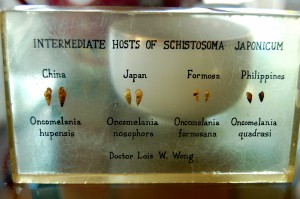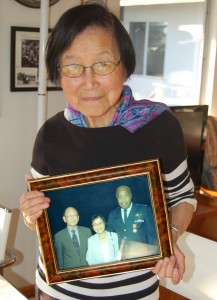Perhaps more than any other professor in the history of California State University, Dominguez Hills, Lois W. Chi, professor emerita of biology, can say she has seen the university evolve. Chi will be presented with the Katherine B. Loker Friend of Education Award for her longtime commitment to the university, her students, and science at the 2012 President’s Scholarship Reception on April 26.
“I feel very honored. I [am] very lucky to get the award,” Chi said.
As one of the 20 founding faculty members serving 180 students, she began teaching at the then-named California State College, Dominguez Hills in 1966. In fact, Chi taught the very first class held on the Watt campus, which was located across Victoria Street from the university’s current location.
“I’m the first one that started the first class in Dominguez Hills in this location, the two-story building,” said Chi, remembering the inaugural 8 a.m. biology class. “I walked into class, I see seven students, all male. Most of them wanted to get into medical school. As far as I know, three of them got accepted.”
Born Lois Wang in Fuzhow, China, in 1921, she left her homeland for America shortly after graduating from high school. In 1956 she married Henry Chi, a noted structural engineer whose firm Goldsmith, Chi and Associates was responsible for the engineering design of a number of large federal, state and commercial projects throughout California and the west.
Chi received her Bachelor of Science from Wheaton College, Ill., in 1945, and a Master of Science and Doctor of Philosophy in biological science from the University of Southern California in 1948 and 1953, respectively. As a research fellow at Loma Linda Medical School, where she taught from 1955 to 1957, she began her life-long work specializing in the control of snails that transmit a blood parasite to humans that causes the fatal disease schistosomiasis.

At Loma Linda, Chi, sometimes known as the “snail lady,” received her first of many consecutive research grants from the National Institutes of Health (NIH). Chi brought the grant with her to Immaculate Heart College, where she taught from 1957 to 1966, and ultimately for the duration of her 16-year teaching career at CSU Dominguez Hills as a professor of biology (1966-1983). She was the first professor to bring a research grant of any kind to the university.
“For all universities to continue, they have to have research,” Chi said, adding, “When you have a research grant, it makes all the difference.”
The grants continued, and they did make a difference. In 1977, Chi received the university’s first NIH Minority Biomedical Research Support (MBRS) grant, a grant program that prepares underrepresented students for research careers in biomedical/behavioral sciences that remains a vital part of College of Natural and Behavioral Sciences today. It was recently renewed for $1.5 million over four years.
Laura Robles, dean of the College of Natural and Behavioral Sciences, and professor of biology, who has overseen the MBRS program since 1986, has known Chi since Robles was hired to the biology faculty in 1975. She said Chi’s legacy goes beyond contributions in scientific research.
“She has been my mentor and she provided me with opportunities that set the stage for my career. I will be forever grateful for what she has done for me,” Robles said, adding that she still sees her former colleague frequently. “I love her and her wonderful husband, Henry.”
Throughout her teaching career, Chi has shaped countless careers and lives of students who have passed through her classroom doors. Among her proudest achievements is the high percentage of her students who have gone on to succeed in post-graduate studies and high-level careers. This was likely a result of her teaching philosophy that each and every student has the potential to excel.
“All students should have the chance to succeed. You have to believe and push them,” said Chi.
Her commitment to students ran deep. Providing an example of her support, Chi said of a particular minority student, “Others in the department would not write a letter of recommendation for him because he was not a top-ranked student; he was a B student. But, I took notice of him. He was always on time and sat in the first row. I knew that he meant business.”

Chi wrote a letter of recommendation for him. He got into medical school and went on to serve as a colonel and medical commander in the United States Air Force. He kept in touch with her over the years–as many of her students have. Before he retired from the military, he posed for a photograph with Chi and her husband, Henry, which she keeps framed in her home.
In 1979, for her excellence in teaching and scholarship, Chi became the first professor from CSU Dominguez Hills to be selected from the entire CSU system as Outstanding Professor of the Year.
Since her retirement in 1983, Chi has continued to support the university as a member of the emeritus faculty association, which engages in support activities, such as annually awarding qualified students with a Dr. Lois W. Chi Emeritus Faculty Association Science Scholarship.
Chi has the distinction of having earned the first parasitology license issued by the State of California Department of Public Health. She was the founder of the Chinese American Faculty Association of Southern California, and a founding member of the Chinese American Engineers and Scientists Association of Southern California. She also served as a member of the National Advisory Council at the request of Caspar Weinberger, former U.S. Secretary of Health Education and Welfare.
Lois and Henry Chi are retired and live in Redondo Beach. Together, they have three grown children.